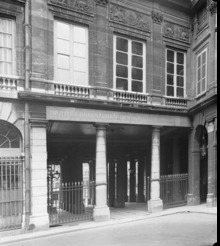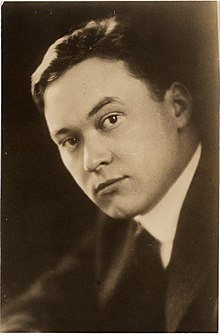Colloque Walter Lippmann
The Colloque Walter Lippmann ( French for colloquium , conversation) was a meeting of intellectuals and academics that took place in Paris from August 26 to 30, 1938 . It was named after the American publicist Walter Lippmann , who served as a key word for the discussion with his recently published work The Good Society . Lippmann was on a trip to Europe and was invited by the French philosopher Louis Rougier to the meeting at the Institut International de Coopération Intellectuelle on Rue Montpensier.
In addition to Lippmann and Rougier, there were numerous representatives of liberal currents from Europe and the USA who, in view of the economic and political crises in the interwar period, were concerned about the state and continued existence of liberalism as a guiding principle and social system. Those present struggled to find answers to questions such as unemployment , the rise of totalitarian systems (for example in Germany or the Soviet Union ) and the appropriate role and opportunities for the state and the markets in shaping public life.
The participants at the meeting disagreed on many points, not least in the name of their renewed liberal program. As a compromise, the term neoliberalism was finally chosen, with which the notes from the Colloque Walter Lippmann document one of the earliest uses of this term.
15 participants in the colloquium founded the Mont Pèlerin Society (MPS) with others in 1947 in order to convince future generations of economically liberal ideas. Today the MPS functions as the central hub of neoliberal networks.
history
At the Colloque, the theses of the American publicist Walter Lippmann on the decline of liberalism and the chances of a renewed liberal order that should differ from laissez-faire liberalism were discussed. In his book "The Good Society", published in 1937, he had sharply criticized socialism , National Socialism and fascism as " collectivist " ideologies . He was ambivalent about the economic and social reforms in the United States , known as the New Deal . In contrast to the Manchester liberalism of the 19th century, the meeting was intended to give new validity to liberal ideas. Rougier's invitation followed Lippmann's 24 other thinkers, economists and industrialists .
The exclusive "laissez-faire" of Manchester capitalism was seen in these discussions as one of the causes of the existing economic crisis , so that a new name should also stand for the new content. Here, put Alexander Riistow term creation of neoliberalism against alternatives such as neo-capitalism , social liberalism or even libéralisme de gauche ( French. Left liberalism) by. However, not all of them adopted the term neoliberalism themselves. Wilhelm Röpke described the commitment to the term neoliberalism as “the least fortunate result of the conference,” Walter Eucken rejected it on principle.
When Colloque Walter Lippmann already the incompatibility of the "old liberals" of showing (after the much-received research by Katrin Meier-Rust) Ludwig von Mises and Friedrich August von Hayek as "neoliberals" Walter Eucken , Wilhelm Röpke and Alexander Rüstow in unmistakable clarity . In retrospect, Riistow regretted that "the compromise final resolution had laboriously maintained the appearance of unity, where in reality the sharpest and most fruitful sub-contradictory opposition existed." Wilhelm Röpke and Alexander Rüstow called the conceptions of the participants in the Colloque Walter Lippmann von Mises and von Hayek as old or palaeoliberalism in order to distinguish them from neoliberalism (in their own sense).
Attendees

- from France: Raymond Aron , Roger Auboin , Louis Baudin , Marcel Bourgeois , Auguste Detœuf , Bernard Lavergne , Étienne Mantoux , Robert Marjolin , Louis Marlio , Ernest Mercier , André Piatier , Jacques Rueff and Louis Rougier
- from Austria: Friedrich August von Hayek , Ludwig von Mises , Stefan Thomas Possony and Alfred Schütz
- from the Anglo-Saxon area: John Bell Condliffe , Michael Polanyi , Walter Lippmann and Bruce Hopper
- from Germany: Alexander Rustow and Wilhelm Röpke
- from Belgium: Marcel van Zeeland
- from Poland: Michael Heilperin
- from Spain: Jose Castillejo
Individual evidence
- ↑ a b Philip Mirowski , Dieter Plehwe (ed.): The Road From Mont Pelerin. The making of the neoliberal thought collective . University Press, Cambridge, Mass. 2009, ISBN 978-0-674-03318-4 , p. 13.
- ↑ Andreas Renner: The two neoliberalisms . In: Questions of Freedom . Issue 256, p. 3, Oct./Dec. 2000, ISSN 0015-928X (PDF; 335 kB)
- ↑ Katrin Meier-Rust: Alexander Rustow. Interpretation of history and liberal engagement (language and history; vol. 20). Klett-Cotta, Stuttgart 1993, ISBN 978-3-608-91627-0 , p. 69 (also dissertation, University of Zurich 1988).
- ↑ Andreas Renner: The two neoliberalisms . In: Questions of Freedom , Issue 256, p. 6, Oct./Dec. 2000 (PDF; 335 kB)
literature
- Reinhoudt, Jurgen & Audier, Serge (Eds.): Neoliberalismus - How it all began: the Walter Lippmann Colloquium , Kursbuch-Verlag, Hamburg 2019, ISBN 978-3-96196-082-8 .
- Milène Wegmann: Early neoliberalism and European integration. Interdependence of the national, supranational and international order of economy and society (1932–1965) . Nomos VG, Baden-Baden 2002, ISBN 3-7890-7829-8 (plus dissertation, University of Bern 2001).
- Philip Plickert: Changes in Neoliberalism. A study on the development and charisma of the Mont Pèlerin Society (market economy reform policy / NF; Vol. 8). Lucius & Lucius, Stuttgart 2008, ISBN 978-3-8282-0441-6 (also dissertation, University of Tübingen 2008).
Web links
- Wolfgang Köhler: Contemporary History - The Mission of Liberalism , ZEIT Online from August 7, 2008
- Romanus Otte: Congratulations - neoliberalism! , Die Welt of August 23, 2008
